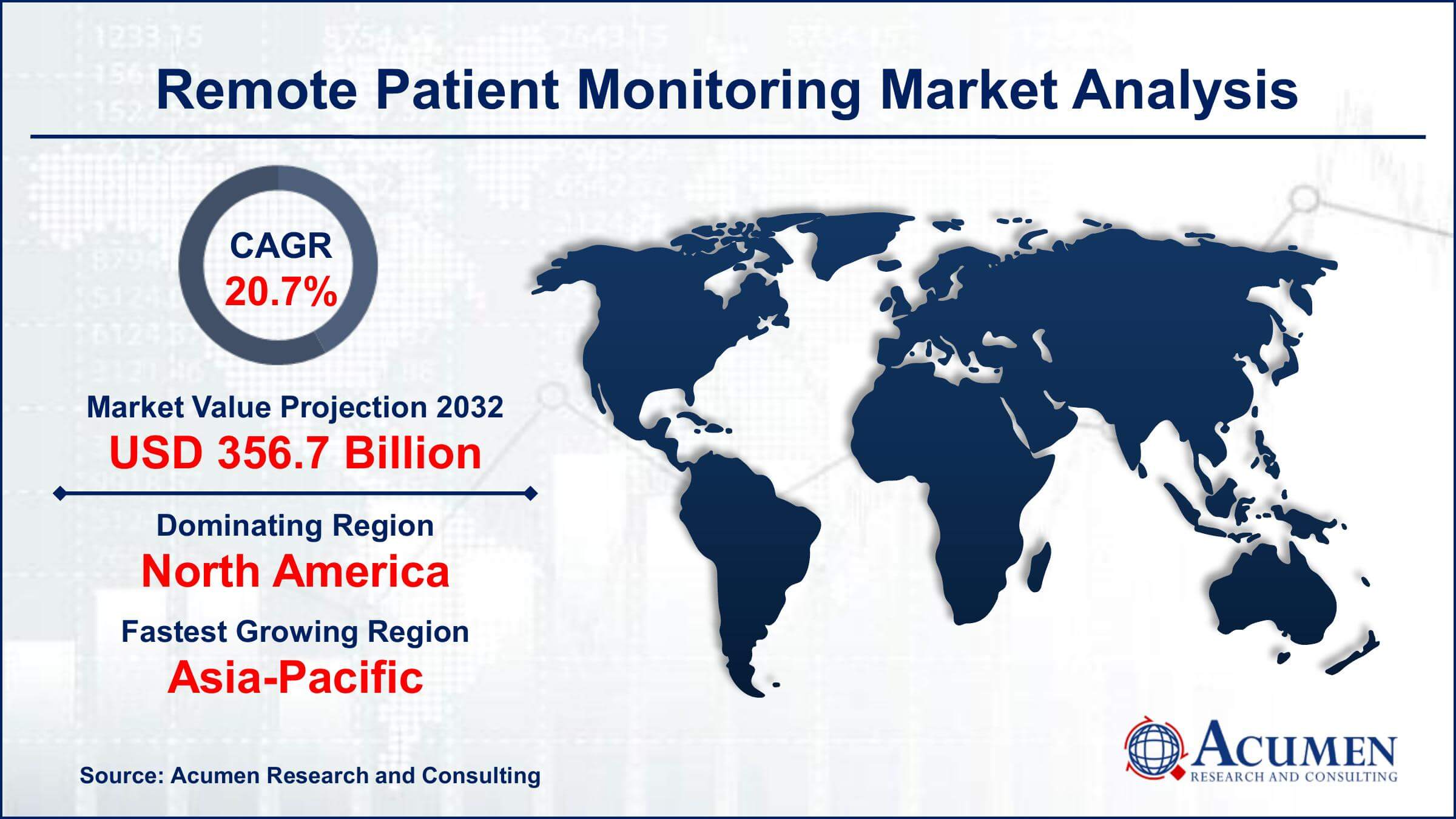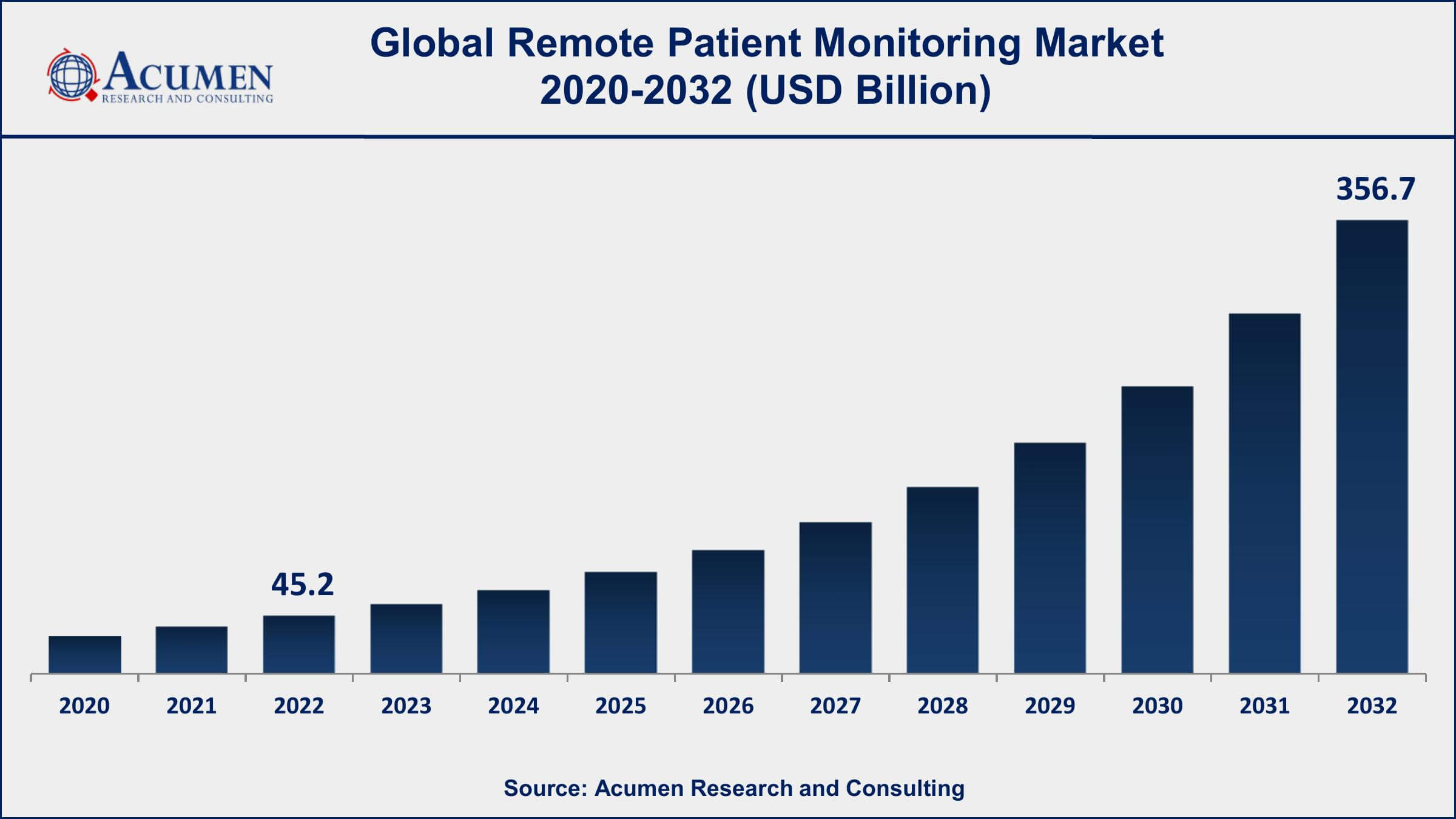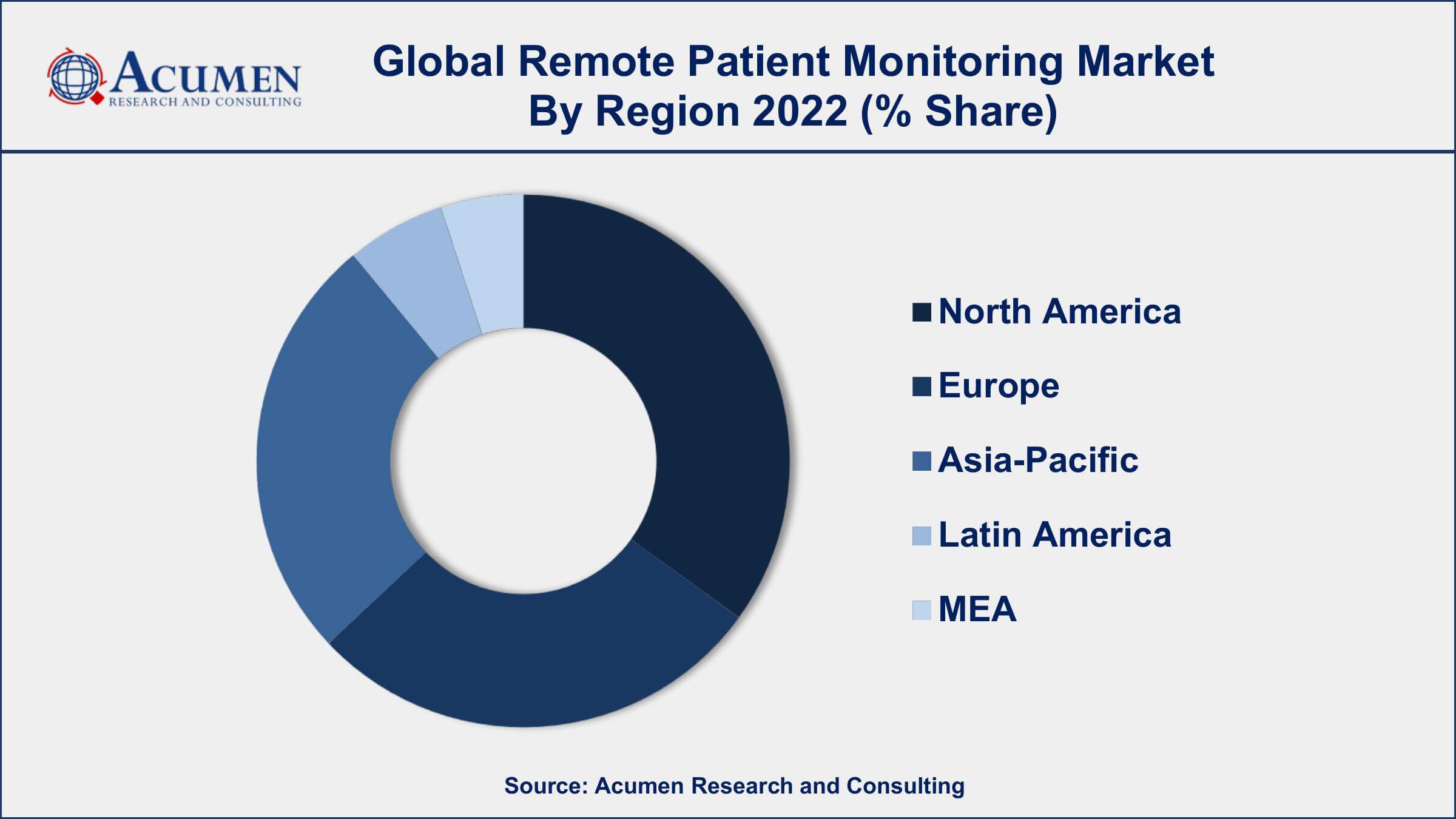Remote Patient Monitoring Market Size - Global Industry, Share, Analysis, Trends and Forecast 2023 - 2032
Published :
Report ID:
Pages :
Format :
Remote Patient Monitoring Market Size - Global Industry, Share, Analysis, Trends and Forecast 2023 - 2032
Report Coverage
- Industry Dynamics
- Market Size and Forecast Data
- Segment Analysis
- Competitive Landscape
- Regional Analysis with a Niche Focus on Country-Level Data
- High Level Analysis - Porter's, PESTEL, Value Chain, etc.
- Company Profiles of Key Players
- Option to Customize the Report As Per Your Specific Need
Request Sample Report
The Remote Patient Monitoring Market Size accounted for USD 45.2 Billion in 2022 and is projected to achieve a market size of USD 356.7 Billion by 2032 growing at a CAGR of 20.7% from 2023 to 2032.
Remote Patient Monitoring Market Highlights
- Global remote patient monitoring market revenue is expected to increase by USD 356.7 Billion by 2032, with a 20.7% CAGR from 2023 to 2032
- North America region led with more than 41% of remote patient monitoring market share in 2022
- According to a survey by Spyglass Consulting Group, 88% of healthcare providers in the United States have invested in or plan to invest in remote patient monitoring solutions
- Asia-Pacific remote patient monitoring market growth will record a CAGR of around 22% from 2023 to 2032
- The home healthcare segment is expected to be the fastest-growing segment in the market, with a CAGR of 21.6% from 2023 to 2032
- Increasing adoption of telehealth and remote care delivery models, drives the remote patient monitoring market value

Remote Patient Monitoring (RPM) is a technology-driven healthcare delivery system that allows healthcare providers to monitor patients' health status and vital signs from a remote location. RPM uses digital tools and medical devices to collect patient data and transmit it to healthcare professionals, who can then analyze the data to identify any changes or trends in the patient's condition. RPM has proven to be a cost-effective and efficient solution for healthcare providers, as it reduces the need for in-person consultations and allows them to provide timely interventions and support to patients.
The Remote Patient Monitoring market has experienced significant growth in recent years, driven by factors such as the increasing prevalence of chronic diseases, rising healthcare costs, and the growing demand for home healthcare solutions. The RPM market is expected to continue to grow rapidly, as healthcare providers increasingly embrace technology-driven solutions to deliver high-quality care to their patients. The development of advanced sensors, wearables, and other medical devices, coupled with the growth of 5G technology and the Internet of Things (IoT), is expected to further fuel the growth of the RPM market in the coming years. Additionally, the increasing focus on patient-centric care and the shift towards value-based healthcare delivery models are expected to drive the adoption of RPM solutions in the healthcare industry.

Global Remote Patient Monitoring Market Trends
Market Drivers
- Rising prevalence of chronic diseases
- Growing demand for home healthcare solutions
- Technological advancements in remote monitoring devices and platforms
- Increasing adoption of telehealth and remote care delivery models
Market Restraints
- Concerns regarding data privacy and security
- Lack of reimbursement policies for RPM solutions
Market Opportunities
- Growing demand for telemedicine and digital health solutions
- Increasing adoption of 5G technology and IoT in healthcare
Remote Patient Monitoring Market Report Coverage
| Market | Remote Patient Monitoring Market |
| Remote Patient Monitoring Market Size 2022 | USD 45.2 Billion |
| Remote Patient Monitoring Market Forecast 2032 | USD 356.7 Billion |
| Remote Patient Monitoring Market CAGR During 2023 - 2032 | 20.7% |
| Remote Patient Monitoring Market Analysis Period | 2020 - 2032 |
| Remote Patient Monitoring Market Base Year | 2022 |
| Remote Patient Monitoring Market Forecast Data | 2023 - 2032 |
| Segments Covered | By Product, By Application, By End Use, And By Geography |
| Regional Scope | North America, Europe, Asia Pacific, Latin America, and Middle East & Africa |
| Key Companies Profiled | Philips Healthcare, Medtronic, Abbott Laboratories, Boston Scientific Corporation, Honeywell Life Care Solutions, GE Healthcare, Masimo Corporation, Johnson & Johnson, Omron Healthcare, Welch Allyn, Resideo Life Care Solutions, and BioTelemetry Inc. |
| Report Coverage |
Market Trends, Drivers, Restraints, Competitive Analysis, Player Profiling, Covid-19 Analysis, Regulation Analysis |
Remote patient monitoring is a healthcare service segment that allows a patient to utilize a medical device to perform and monitor a general routine test and send the concerned results of the test to healthcare professionals in real-time, sitting at remote locations. In alignment with the recent trend of patients desiring medical care at their homes, various remote patient monitoring devices have been launched to eliminate the overall need for frequent visits to health clinics and hospitals. Hence, remote patient monitoring devices provide a more customized treatment and post-treatment plan. Remote patient monitoring is a technique generally used to receive and collect medical and other health-related information from individual patients present at one location and thus transmit the same electronically to a healthcare professional sitting at a remote location. Remote patient monitoring devices are used to analyze and monitor physiological parameters such as vital signs, blood oxygen levels, blood pressure, heart rate, and blood sugar, thus improving the quality of life, and quality of care, and permitting easier and earlier prediction of exacerbations and aggravations remotely. This reduces the overall duration of hospitalization and emergency department visits. This is attributed to the improving access to healthcare systems, a large undiagnosed patient population, and a high risk of developing chronic disease due to rapid urbanization.
Diabetes, various chronic heart diseases such as cancer, etc., and chronic respiratory diseases are the major causes of mortality and morbidity, worldwide. According to WHO, chronic care management accounts for approximately 75% of overall healthcare expenses. Hence, the increase in the prevalence of chronic illnesses creates an enormous financial burden on caregivers. This is where remote patient technologies come into role play and identifies even the small changes in the patient’s physiological information and sustains self-monitoring. Thus, the reduction of readmissions and prevention of avoidable hospitalizations is achieved using remote patient monitoring systems. Moreover, remote patient monitoring reduces the number of unnecessary visits to the doctors and reduces the overall travel-related expenses which are necessary for receiving efficient medical care. On a short and long-term basis, remote patient monitoring systems, by properly implemented, can expand access to quality healthcare facilities and thus can save the total turnaround time and expenses. Increasing expenditure on healthcare facilities coupled with increasing demand for effective treatment solutions for fatal chronic diseases is anticipated to boost the overall growth of the global remote patient monitoring market. The global remote patient monitoring market is also anticipated to be driven by the rise in the geriatric population suffering from chronic diseases, thus propelling the demand for remote patient monitoring devices. In addition, the rising awareness towards remote patient monitoring devices amongst physicians and patients, and demand for opinion-based diagnosis of chronic diseases due to lack of standard diagnostic tests especially in rural areas is projected to surge the growth of the global remote patient monitoring market in near future. However, the lack of trained professionals to operate remote patient monitoring devices and systems is expected to hinder the growth of the global remote patient monitoring market. Moreover, insufficiency in maintaining the security and privacy of stored information and data coupled with a lack of general awareness of patient monitoring and a lack of uniformity in device functionality are the key factors challenging the growth of the global remote patient monitoring market.
Remote Patient Monitoring Market Segmentation
The global remote patient monitoring market segmentation is based on product, application, end use, and geography.
Remote Patient Monitoring Market By Product
- Vital Sign Monitors
- Blood Pressure Monitors
- Heart Rate Monitor (ECG)
- Pulse Oximeters
- Respiratory Rate Monitor
- Temperature Monitor
- Brain Monitoring (EEG)
- Special Monitors
- Blood Glucose Monitors
- Anesthesia Monitors
- Respiratory Monitor
- Cardiac Rhythm Monitor
- Fetal Heart Monitors
- Multi Parameter Monitors (MPM)
- Prothrombin Monitors
- Others
According to the remote patient monitoring industry analysis, the special monitors segment accounted for the largest market share in 2022. The special monitors segment refers to medical devices that are designed to monitor specific health conditions or parameters, such as blood glucose levels, blood pressure, or oxygen saturation levels. One of the key drivers of growth in the special monitors segment is the rising incidence of chronic diseases such as diabetes, hypertension, and cardiovascular diseases. Patients with these conditions require regular monitoring of their vital signs, and special monitors provide an effective solution for remote monitoring of these parameters. The increasing demand for personalized healthcare solutions and the growing trend toward patient-centric care is also driving the growth of the special monitors segment in the RPM market.
Remote Patient Monitoring Market By Application
- Cancer
- Diabetes
- Cardiovascular Diseases
- Weight management and Fitness Monitoring
- Sleep Disorder
- Infections
- Bronchitis
- Dehydration
- Virus
- Hypertension
In terms of applications, the diabetes segment is expected to witness significant growth in the coming years. Diabetes is a chronic condition that affects millions of people worldwide, and the rising prevalence of diabetes has been a key driver of growth in the diabetes segment of the RPM market. Remote monitoring solutions for diabetes management, such as Continuous Glucose Monitoring (CGM) systems, have become increasingly popular in recent years. CGMs are wearable devices that use sensors to monitor a patient's blood glucose levels in real time and transmit the data to healthcare providers for analysis. This enables healthcare providers to make timely interventions and adjustments to the patient's treatment plan, reducing the risk of complications and improving patient outcomes.
Remote Patient Monitoring Market By End Use
- Hospital Based Patients
- Home Healthcare
- Ambulatory Patients
According to the remote patient monitoring market forecast, the home healthcare segment is expected to witness significant growth in the coming years. The home healthcare segment market refers to medical devices and solutions that are designed to enable patients to receive high-quality healthcare services in the comfort of their own homes. Remote patient monitoring solutions have become increasingly popular in the home healthcare segment, as they enable healthcare providers to monitor patients' health status and vital signs remotely and provide timely interventions and support when necessary. This has helped to reduce the need for in-person consultations, enabling healthcare providers to save time and resources while providing high-quality care to their patients.
Remote Patient Monitoring Market Regional Outlook
North America
- U.S.
- Canada
Europe
- U.K.
- Germany
- France
- Spain
- Rest of Europe
Asia-Pacific
- India
- Japan
- China
- Australia
- South Korea
- Rest of Asia-Pacific
Latin America
- Brazil
- Mexico
- Rest of Latin America
The Middle East & Africa
- South Africa
- GCC Countries
- Rest of the Middle East & Africa (ME&A)

Remote Patient Monitoring Market Regional Analysis
North America dominates the Remote Patient Monitoring (RPM) market due to several factors. One of the key drivers of growth in the North American RPM market is the presence of well-established healthcare infrastructure and a high level of awareness among patients and healthcare providers about the benefits of remote patient monitoring solutions. The region also has a high prevalence of chronic diseases such as diabetes, cardiovascular diseases, and respiratory diseases, which has further increased the demand for RPM solutions. Additionally, favorable government initiatives and policies, such as the Affordable Care Act (ACA) in the United States, have encouraged the adoption of technology-driven healthcare solutions, including remote patient monitoring. The availability of advanced healthcare technologies and a highly skilled workforce have also contributed to the growth of the RPM market in North America.
Remote Patient Monitoring Market Player
Some of the top remote patient monitoring market companies offered in the professional report include Philips Healthcare, Medtronic, Abbott Laboratories, Boston Scientific Corporation, Honeywell Life Care Solutions, GE Healthcare, Masimo Corporation, Johnson & Johnson, Omron Healthcare, Welch Allyn, Resideo Life Care Solutions, and BioTelemetry Inc.
Frequently Asked Questions
How big is the remote patient monitoring market?
The remote patient monitoring market size was USD 45.2 Billion in 2022.
What is the CAGR of the global remote patient monitoring market from 2023 to 2032?
The CAGR of remote patient monitoring is 20.7% during the analysis period of 2023 to 2032.
Which are the key players in the remote patient monitoring market?
The key players operating in the global market are including Philips Healthcare, Medtronic, Abbott Laboratories, Boston Scientific Corporation, Honeywell Life Care Solutions, GE Healthcare, Masimo Corporation, Johnson & Johnson, Omron Healthcare, Welch Allyn, Resideo Life Care Solutions, and BioTelemetry Inc.
Which region dominated the global remote patient monitoring market share?
North America held the dominating position in remote patient monitoring industry during the analysis period of 2023 to 2032.
Which region registered fastest CAGR from 2023 to 2032?
Asia-Pacific region exhibited fastest growing CAGR for market of remote patient monitoring during the analysis period of 2023 to 2032.
What are the current trends and dynamics in the global remote patient monitoring industry?
The current trends and dynamics in the remote patient monitoring industry include rising prevalence of chronic diseases, growing demand for home healthcare solutions, and technological advancements in remote monitoring devices and platforms.
Which application held the maximum share in 2022?
The diabetes application held the maximum share of the remote patient monitoring industry.



